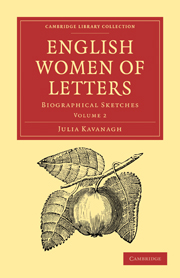Summary
The “Tales of Fashionable Life” are the gravest but most entertaining lessons of morality deducted from the lives of the vain and the frivolous. What a collection of portraits! The wonderful Mrs. Beaumont, the weak Vivian, the worldly Almeria, the wearied Lord Glenthorn! In vain we know that they are not real persons, that they represent certain faults, certain states of temper; in vain the tales are, like the heroes, moral ideas—Manœuvring, Vacillation, Worldliness, Ennui—we are ruled by a quiet and clear power against which it is useless to rebel. Sometimes we are caught by an admirable delineation of temper, sometimes by a humorous sketch of Irish character, sometimes again by some fine human lesson on the hollowness of all deceit, or the vanity of worldly wishes, and whatever it is, we are mastered.
The daring of genius alone could make Miss Edgeworth venture on such a subject as that of “Ennui.” Yet how admirably she treated it! In vain we care little for the hero, whether as Earl of Glenthorn or Christy O'Donoghoe—in vain we know that he is ennui past or ennui present; we are amused, spite all his wretchedness. His journey to his Irish estates, his description of the chaise in which his servants travel, and of Paddy's encounter with the galled horse, Knockecroghery, and Paddy's exultation at poor Knockecroghery's defeat, are most entertaining.
- Type
- Chapter
- Information
- English Women of LettersBiographical Sketches, pp. 150 - 179Publisher: Cambridge University PressPrint publication year: 2010First published in: 1863



